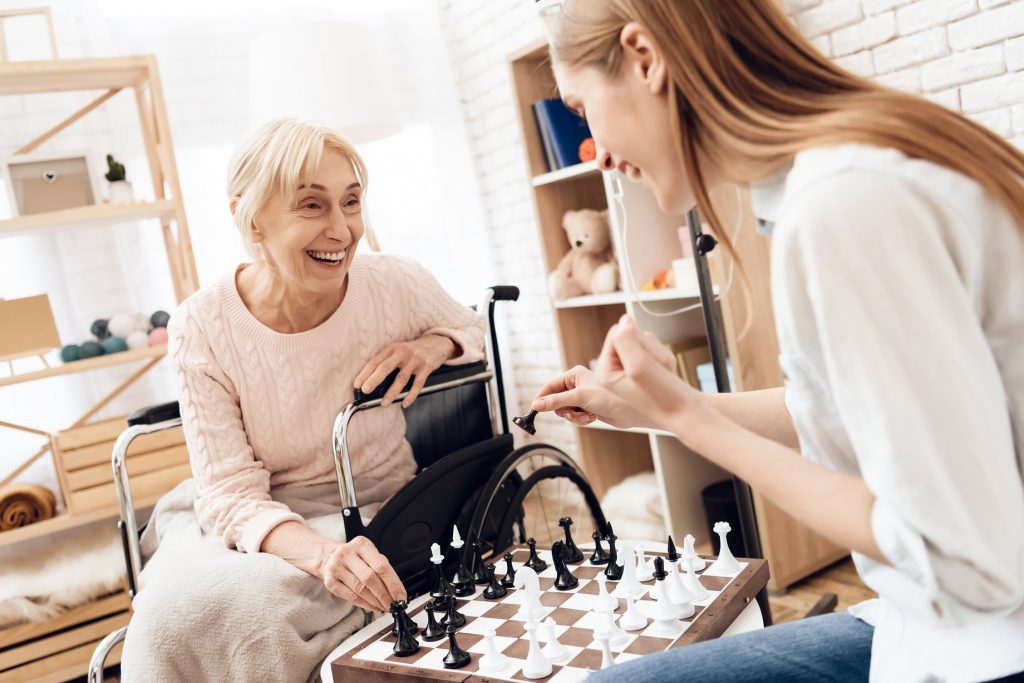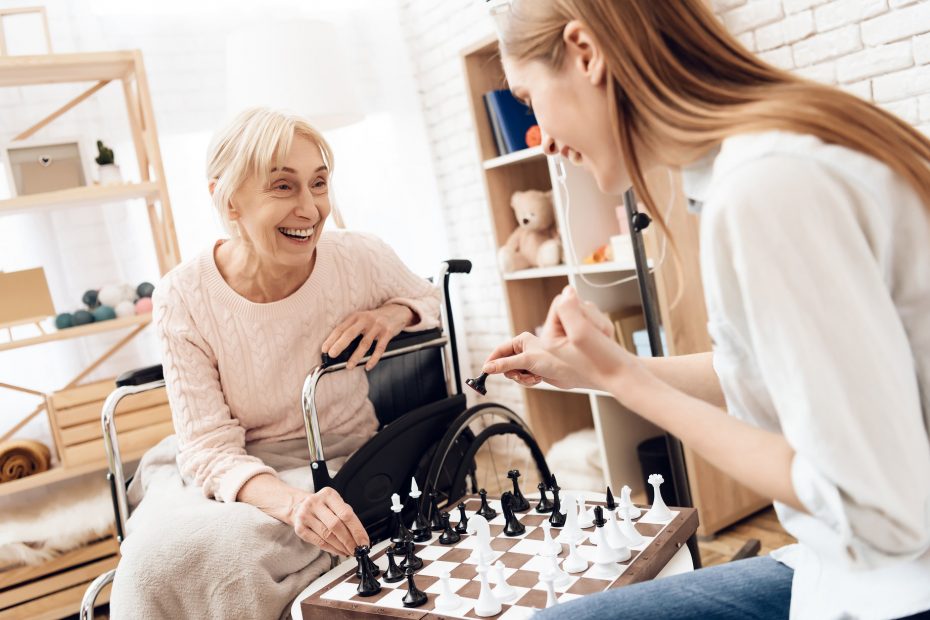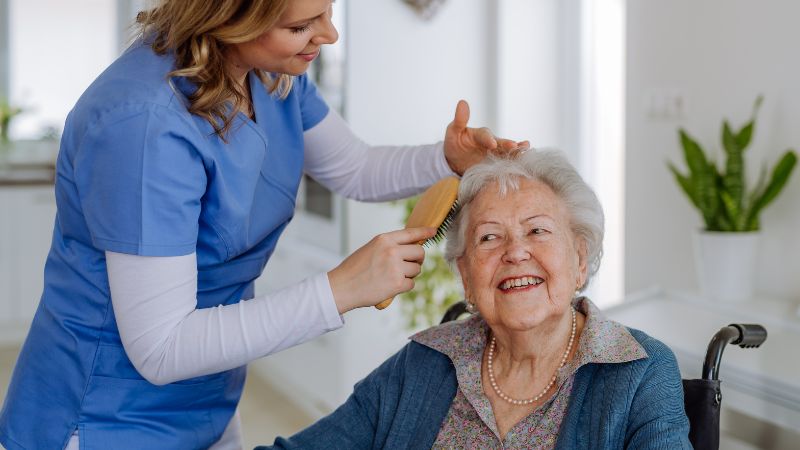
Caregivers may be plunged into their new role after a loved one’s sudden illness or injury. Little do first time caregivers know how difficult—yet rewarding—their caregiving journey will be. Following are expectations and guidance to help first time caregivers ease into their new responsibility.
Why do seniors need a caregiver?
Aside from an unexpected injury or illness, seniors may need extra support at home for many reasons. The aging process naturally causes older adults to slow down. Everyday tasks that were once completed effortlessly may become too tiresome for seniors to independently perform.
A dementia diagnosis can also urge family members to plan for future care. Alzheimer’s disease and other types of dementia are progressive conditions, meaning affected seniors will continue to decline in cognitive and physical functioning over time. Daily help will be necessary.
First time caregivers may also find themselves gradually assuming more and more responsibilities as elderly loved ones need greater care. Fulltime caregiving may be expected. Whether a family member is committed to fulltime or intermittent care, first time caregivers must know how to succeed.
1. Discuss caregiving early on
Initiate discussions about caregiving options with a senior prior to the individual needing care. An aging loved one may have preferences about matters surrounding health and finances. If the senior avoids the topic of caregiving, invite an objective third party to start the talks; seniors are more likely to listen.
2. Create a caregiving support team
Include relatives, friends, and professionals in caregiving conversations. A supportive social circle will lift the stress involved in caregiving. Caregivers who are the least stressed perform their caregiving duties more optimally than those who are exhausted, unfocused, or show other symptoms of burnout.
This network of friends and family will be available to assist with caregiving tasks. Meaningful support, no matter how small or infrequent, makes a big difference. Local agencies on aging offer programs to help seniors and should also be included as an important part of the support team.
3. Obtain healthcare information
A first-time caregiver who is knowledgeable about a care recipient’s health will be better able to meet the senior’s needs. Be aware of the senior’s medications and current treatments. A caregiver who is expected to take blood pressure or give injections can learn these skills from the senior’s nurse.
First time caregivers should be prepared when the aging individual needs a higher level of care. Illness can unexpectedly strike. A senior may break a hip or experience a stroke. Learn about local home care agencies or assisted living facilities in preparation for the future.
4. Modify the home environment
Aging can increase the difficulty level of certain everyday tasks. A senior who is wheelchair bound will need a home built with ramps instead of stairs. A senior’s vision may become gradually poorer. Install motion-sensor lights in the bathrooms and night lights in the hallways to promote safety.
The bathrooms are slick and dangerous environments for seniors. One slip on the tile floors can lead to a serious injury. Reduce the risk for falls by installing grab bars in the shower and near the toilet. Add an adjustable shower seat to prevent exhaustion during showering.
5. Use technology to stay organized
Countless healthcare and financial details will be on a first-time caregiver’s plate. The caregiver must keep track of prescriptions, doctor’s appointments, health records, and emergency contact information. Caregiving apps are available to keep a caregiver from becoming overwhelmed with information.
Two invaluable caregiving apps recommended by AARP are CareZone and Medisafe. Healthcare information may be readily accessed through Microsoft HealthVault. Various other apps help caregivers stay on top of scheduling and meal planning. Organization is key to caregiving at any stage.
6. Practice self-care
A frazzled caregiver is unable to provide quality care. By focusing on the daily care needs of another individual, first-time caregivers may fall into a habit of self-neglect. Forgetting to care for oneself can lead to depression, high stress levels, and a number of other health consequences.
First time caregivers are urged to eat well, get adequate sleep, and exercise. Find ways to engage in enjoyable activities, like yoga, movie nights with friends, or shopping trips. Avoid feeling guilty about having fun. Moments of relaxation reduce stress and are necessary to continue giving quality care.
7. Encourage independence
Promote independence in seniors whenever possible. A senior who is encouraged to independently perform activities when it is safe to do so will feel less reliant on the caregiver and more self-empowered. Involve the senior in discussions about important matters, like living situations, too.
Caregiving rarely comes with a clear road map. Each caregiving scenario is different, and first-time caregivers should not expect to immediately become caregiving experts. Caregivers who approach situations with patience and take each day step by step will be rewarded for their dedication.
An important aspect of every caregiving plan is to include respite care services from Assisting Hands Home Care. Caregivers, whether first time or experienced, deserve occasional breaks from daily caregiving. Both the family caregiver and the care recipient will experience the benefits.

Family caregivers who hire respite care from our reputable home care agency can be assured that their elderly loved one will receive compassionate, quality care. Our respite caregivers are experienced in assisting seniors with daily activities, including personal hygiene, transportation, and meal preparation.
Families that utilize respite care reduce their stress levels and are able to return to caregiving duties with renewed focus and energy. Family caregivers also reduce their risk for depression. Assisting Hands Home Care services are convenient and flexible, allowing us to accommodate various schedules.
Integrate quality respite care from Assisting Hands Home Care into your family caregiving routine. Our home care starts with a complimentary in-home consultation, where we assess your loved one’s care needs and develop a care plan. We are privileged to serve seniors living in Naperville, Glen Ellyn, Lisle, Warrenville, Westmont, Wheaton, Woodridge, Illinois, and surrounding areas. Call today.
















